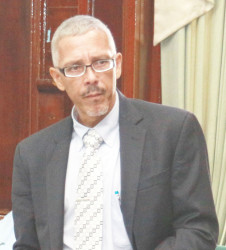Against the backdrop of questions that continue to arise about Guyana’s state of preparedness to significantly raise the quality of its response to external investment enquiries, Minister of Business Dominic Gaskin told a gathering of regional entrepreneurs that Guyana is now ready to put in motion a plan to make it easier for potential investors to do business here.
“…We at the Ministry of Business have made it one of our priorities to make Guyana an easier place to do business. We have developed an action plan of doing business reforms which will be rolled out over the next two years and will bring significant improvements to the ease of doing business in Guyana. It’s fairly comprehensive and relies on a number of agencies to collaborate and in some cases amend and introduce legislation to change and improve the way certain things are done,” Gaskin told Monday’s Republic Bank-hosted Trade Mission to Guyana, an event designed to create links between the local business community and the bank’s business clients in Trinidad and Tobago, Suriname and Barbados.
The Government of Guyana, Gaskin told the forum, is supportive of “an economic model that sees private sector investment as the key driver of sustainable growth” and disposed to a long-term partnership between government and private sector to create an economy that is relevant not only to the people of Guyana but also to the wider region and beyond.

It is Gaskin’s declaration of an official commitment to removing the long-existing and in some instances formidable bureaucratic hurdles that have, over the years, caused potential investors to walk away from Guyana, that would have caused the regional businessmen to sit up and listen. It comes against the backdrop of what has been, over the years, no shortage of official rhetoric regarding government’s determination to strip away the barriers to investment as manifested in tedious and often needless procedures that have caused entrepreneurs to take their investment dollars elsewhere.
Unsurprisingly, the response among some of the participants at the conclusion of Gaskin’s address was to state candidly that if Guyana is to succeed in realizing the goals of the forum’s theme, ‘Building Strong and Sustainable Relationships Across Borders,’ the government will have to provide a measure of assurance that goes beyond what the minister had to say.
To say, as Gaskin did in his address to the forum that the incumbent administration “may not have inherited a well-oiled machine for handling businesses and investors” is to understate the extent of the challenge. Indeed, the remark came on the heels of the release earlier in November of the Ministry of Business’ Strategic Plan (2016 – 2020) which had much to say about the lack of readiness of several key domestic agencies, not least the key Guyana Office for Investment (GO-Invest) to take on the responsibility of fully facilitating foreign investment. The list of institutional weaknesses includes, critically, a chronic shortage of skills necessary to execute the various facets of investment facilitation. Worryingly, there is, as yet, no clearly outlined plan for bridging the gap between Gaskin’s undertaking that government will roll out a new, workable investment template and the skills deficiencies that exist in those agencies that will be chiefly responsible for implementation.
In his address Gaskin alluded to the significance of Republic Bank’s role as host to the forum. “Financing,” he said, “plays a critical role in business development,” adding that “our bankers need to be fully on board when we contemplate business relationships.
“We in Guyana are aware of the challenges in raising capital. The high cost and the stringent requirements through the formal banking system, coupled with our underdeveloped capital markets do not provide a full enough range of financing options for a well-diversified economy to take shape.”
He could hardly have been more right. High interest rates and stringent borrowing criteria have virtually locked the vast army of emerging small and micro businesses out of the mainstream banking sector though in relatively recent years, the clamour for a more liberal lending regime have nudged most commercial banks, including Republic Bank in the direction of creating new lending arrangements.





